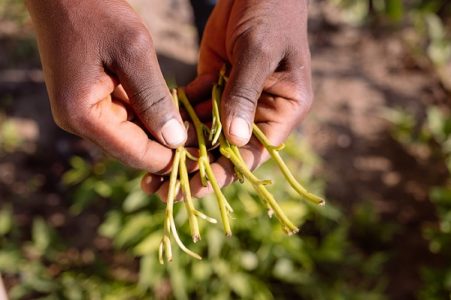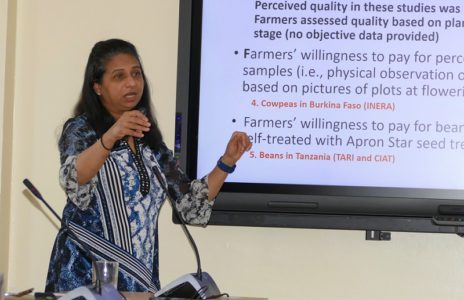
Experimental auctions reveal the true willingness of farmers to pay (WTP) for various farming inputs. This is one of the main findings of scientists with the CGIAR Research Programs on Policies, Institutions and Markets (PIM) and Roots, Tubers and Bananas (RTB) now working to strengthen seed systems. Using this method, which is on the rise for smallholders in low- and middle-income countries, farmers bid for quality farming inputs with real cash.
Understanding the supply and demand of quality seed for farmers would allow scientists to forecast the effects of policy changes on consumption, according to Marcel Gatto, Agricultural Economist with the International Potato Center (CIP).
Experimental auctions provide incentives for farmers to truthfully reveal values, Patrick Ward of Duke Kunshan University pointed out, explaining that they elicit people’s ‘homegrown values for goods’. Data from the auctions can be used to generate demand curves, estimate product market shares and relative WTP or price premiums for enhanced product quality.
With support from the PIM project, “Strengthening seed systems and markets”, a workshop on 21-22 March in Nairobi, Kenya explored the usefulness of experimental auctions and how to adapt them to local contexts. Scientists from various CGIAR centers, national agricultural and research organizations (NAROs) and local and international universities focused on understanding farmers’ willingness to pay for quality seed of vegetatively propagated crops such as potatoes, sweetpotatoes and cassava.
The workshop included a mock auction in which participants bid for a bar of chocolate. After being presented the chocolate, they were asked to submit their individual bids on a form that included some survey questions. A price was then generated using a random price generator. The participants who submitted a bid equal to or above the randomly drawn price were able to purchase the bar at the random price.
Exploring farmers’ WTP for quality seed in root, tuber and banana crops
Eliciting demand for seed is an important research topic for the work of the CGIAR Research Program on Root, Tubers and Bananas (RTB). Farmers still do not invest in quality seed in RTB crops. Over 90% of RTB farmers access planting materials through informal channels (i.e. other farmers or traders) or use recycled planting materials from their own production. Formal options through extension services or private sector are limited. Furthermore, there is little awareness about quality planting material and regulatory bodies do not often have the capacity and enforcement ability to monitor seed production and distribution through the formal sector. In Nigeria, for example, it was noted that there are few inspectors trained to examine the quality of cassava seed.
Seed producing farmers/entrepreneurs also have limited access to early generation seed coupled with other issues, such as insufficient transport and storage facilities. The case is the same for Rwanda, where low yield persists due to the lack of access to quality planting material. Most farmers still rely on social networks to obtain sweetpotato vines.
CIP Agricultural Economist, Srinivasulu (Srini) Rajendran identified potential opportunities for the PIM team to collaborate with the RTB seed system team in conducting experimental auction studies on various RTB crops. For instance, follow up studies could be conducted with farmers who participated in the experimental auction studies to explore gender aspects through qualitative assessments.
For the two proposed studies—estimating demand for quality planting material of improved cassava varieties in Nigeria and WTP for sweetpotato planting material of OFSP in Rwanda—context matters. The availability of sweetpotato vines that are distributed for free is a problem and could become a substitute product. As free distribution is often done with high quality vines, it can be hard for farmers to attach a value to vines in an auction if substitute is equally good and available free of cost. Participants agreed that if a farmer’s WTP depends on the price of substitute goods, then freely available seeds will reduce demand.
Julius Okello, CIP Impact Assessment and Monitoring and Evaluation Specialist, affirmed that the auction must be held at a time when farmers need materials. “Just before the planting season would be a perfect time to conduct auctions. Considering that the shelf life of sweetpotato vines is short, the timing of the auction experiments is critical to elicit farmers’ true WTP,” he noted.
Gender considerations are important as the valuations made by men and women are different. “In Malawi women said they would rather buy poor quality seed that they can afford rather than have their families go hungry,” Netsayi Mudege, Gender Research Specialist at CIP, pointed out. The research design must take into consideration the different valuations of quality seeds by men and women and how that can influence bidding, she emphasized.
Way forward

Drawing lessons from previous studies conducted by Mywish Maredia of Michigan State University on the role of quality signaling on WTP for potato planting material in Kenya and the theory of value elicitation provided by Patrick Ward, the workshop was successful in discussing and aligning methods across the two case studies identified. Local partners from Kenya including the University of Nairobi, Rwanda Agriculture and Animal Resources Development Board (RAB) and National Root Crops Research Institute (NRCRI) in Nigeria provided valuable contextual insights.
As a next step, the methodologies will be revised to take into consideration the various issues and challenges raised in the workshop. Jointly with NRCRI, Tesfamichael Wossen, Postdoctoral Fellow – Agricultural Economist with the International Institute of Tropical Agriculture (IITA) will carry out a study on cassava. In Rwanda, Julius Okello, Srini Rajendran and Kirimi Sindi from CIP will collaborate with RAB to look at factors that influence farmers’ WTP for quality sweetpotato vines. These studies will be co-funded by PIM and RTB, and will be implemented over the coming planting seasons in the respective countries.
Learn more about RTB http://www.rtb.cgiar.org/ and PIM https://pim.cgiar.org/
